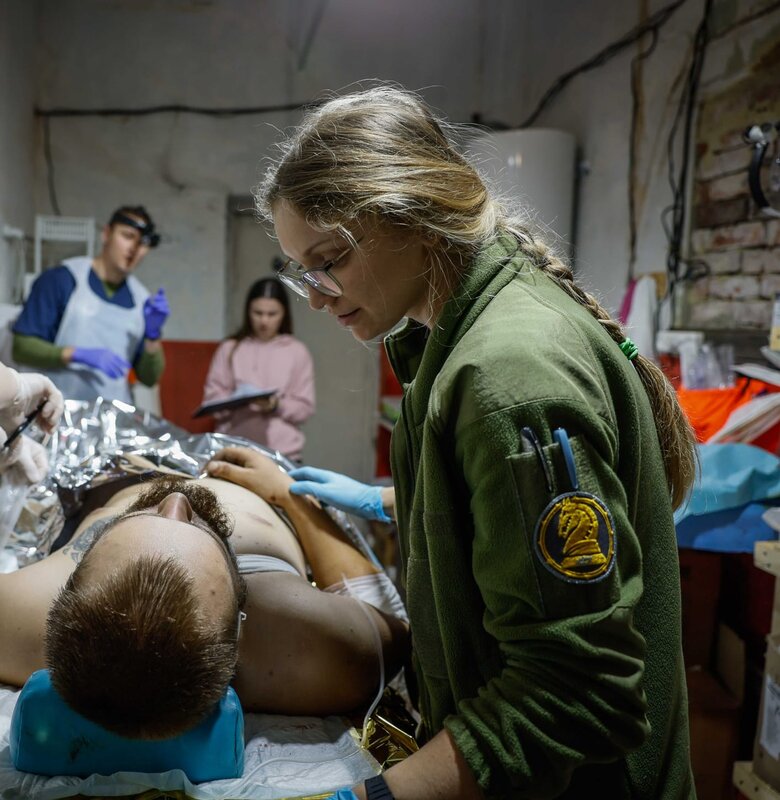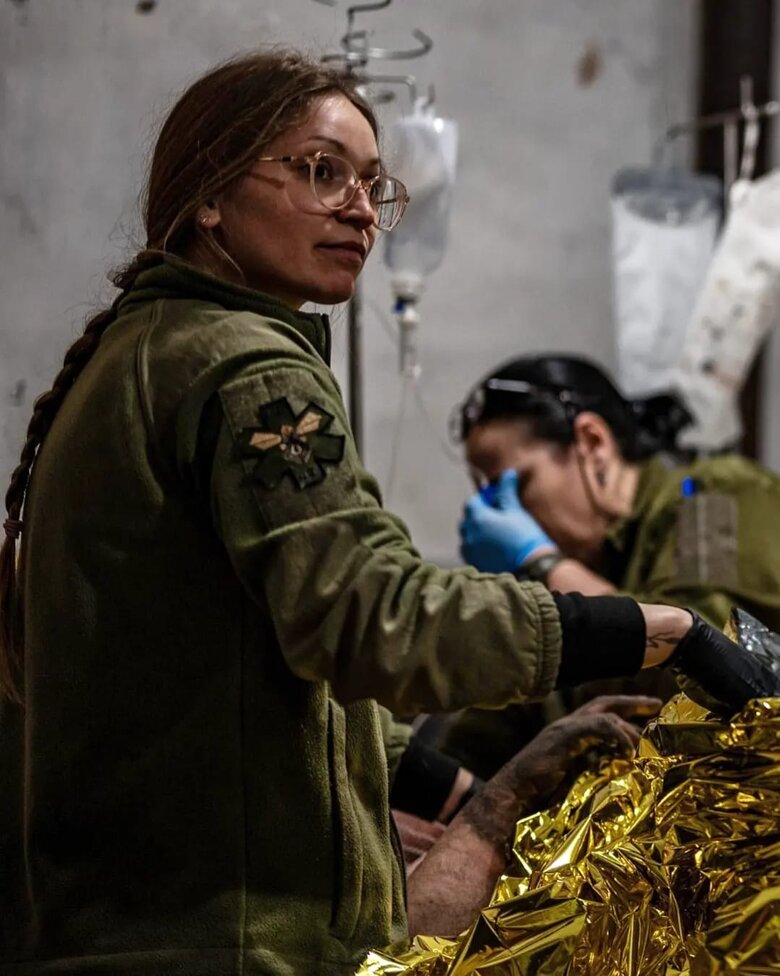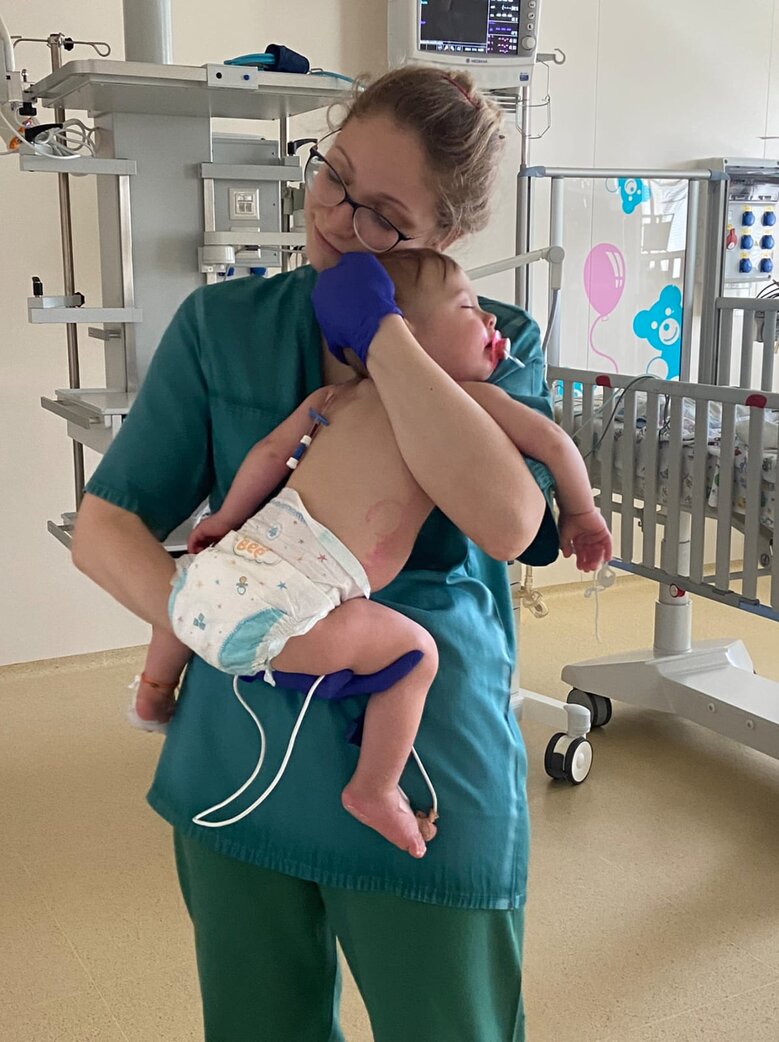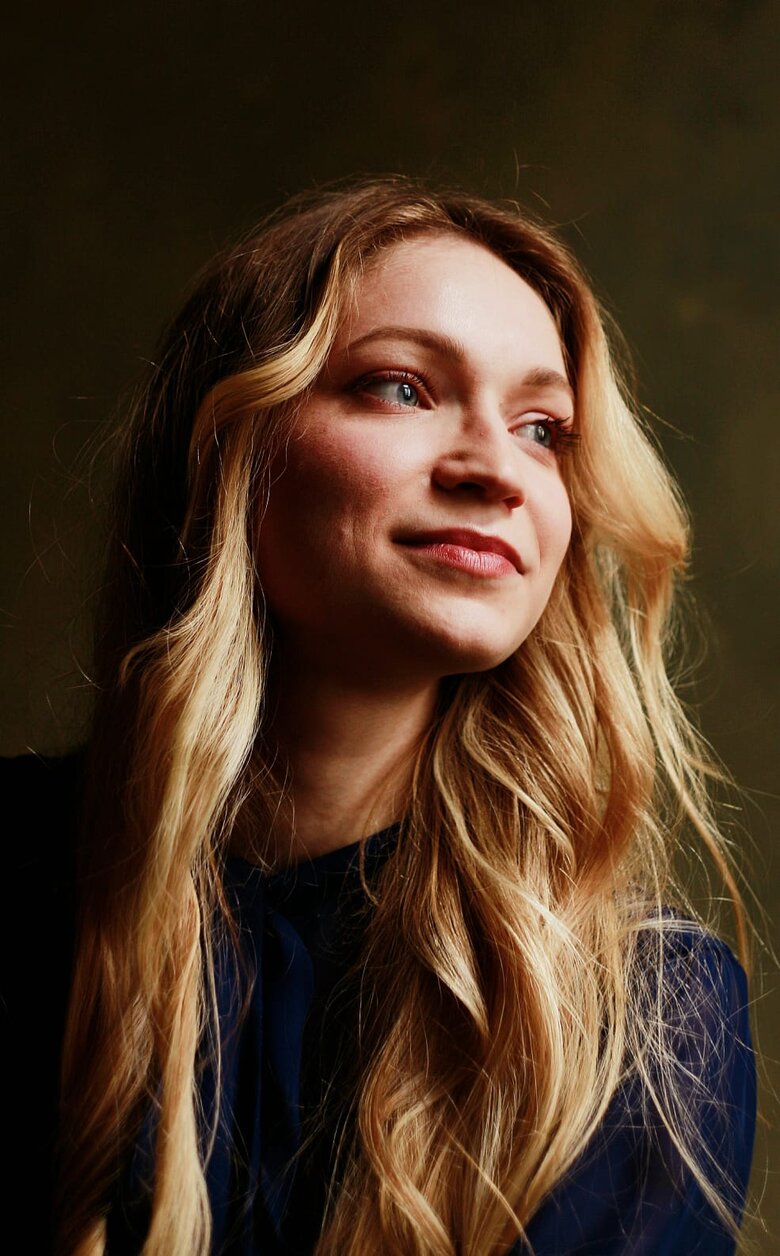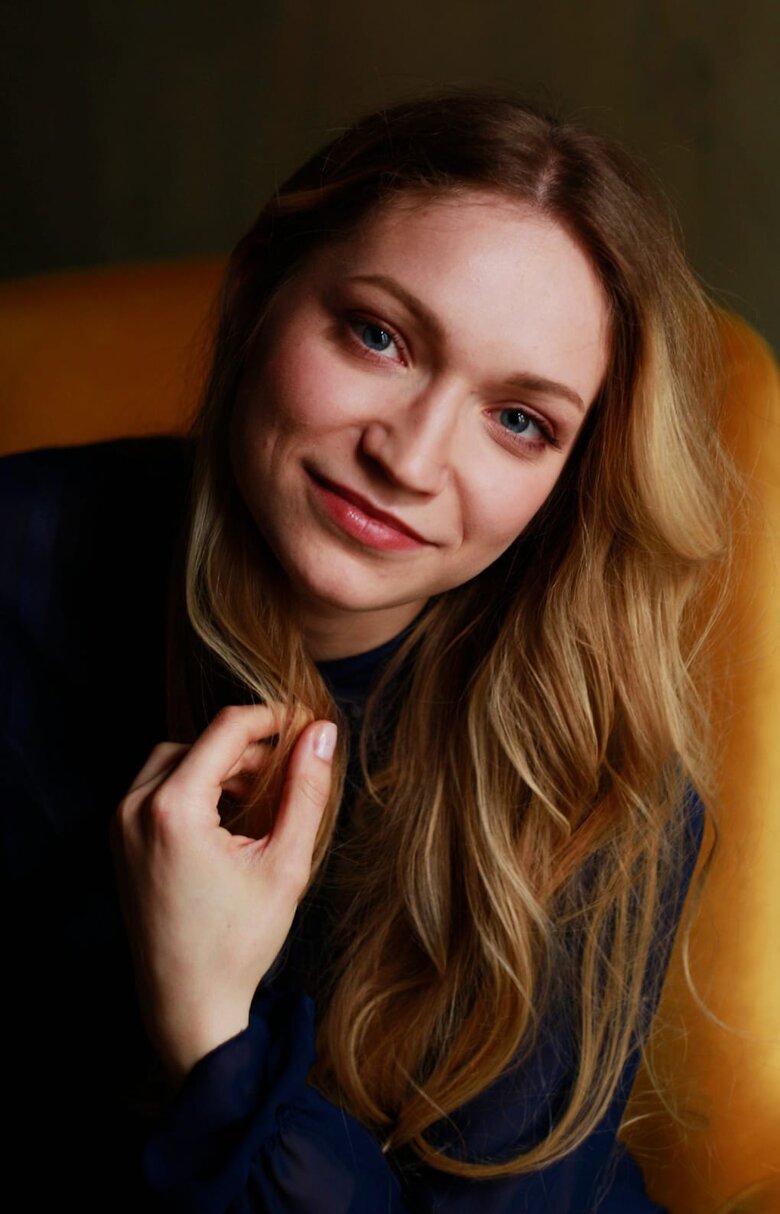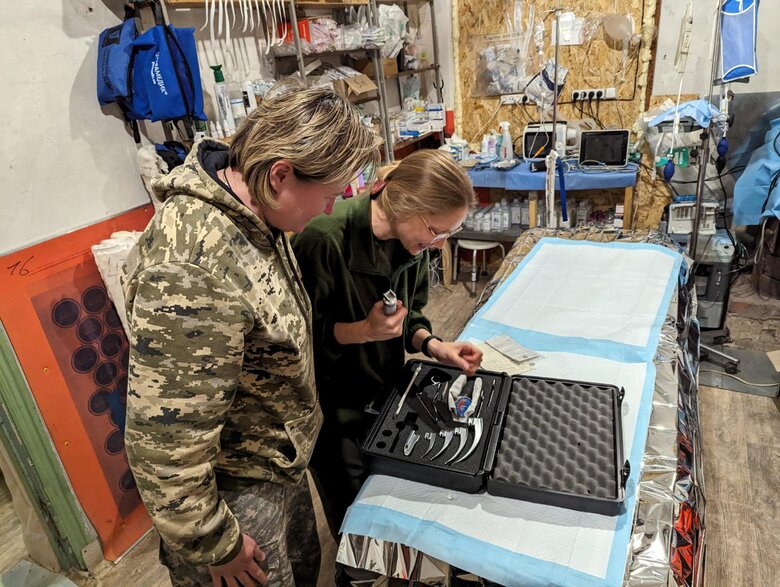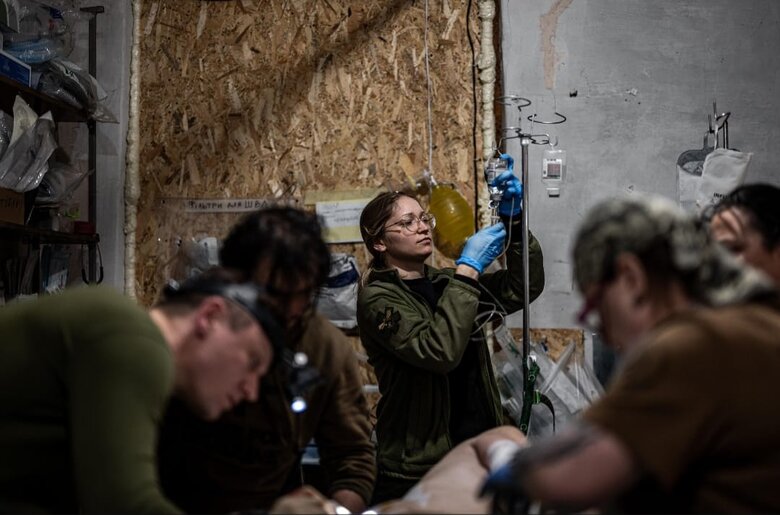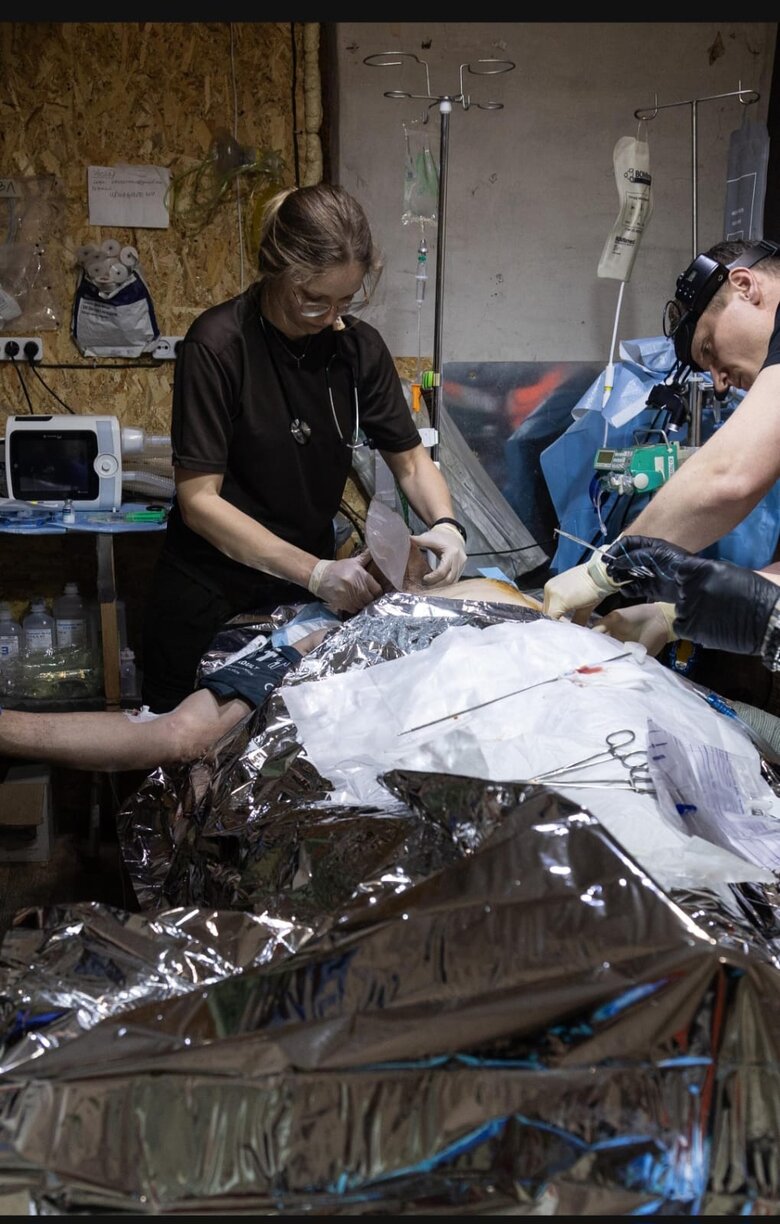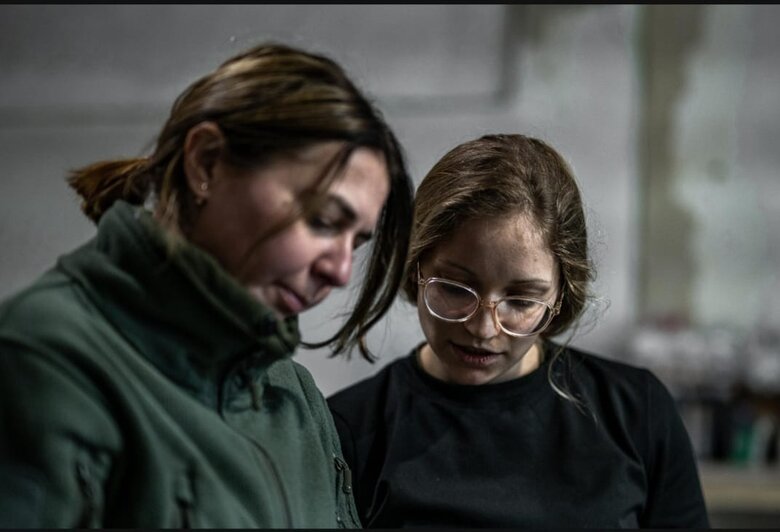Oksana Surova, anesthesiologist of 47th Brigade: Wounded man was clinically dead. 40th minute of resuscitation had passed: we had to make decision. But we continued to defibrillate for another 11 minutes, and rhythm appeared
In civilian life, she was a pediatric anesthesiologist. Now 29-year-old Oksana Surova, call sign Cinnamon, is a medic of the 47th Brigade who stabilizes (and sometimes saves) the wounded in the Kursk direction. Disciplined, responsible and at the same time pure-hearted, she tells Censor.NET about the everyday life of a doctor at a stabilization point and shares dramatic episodes of her life in the AFU.
Listening to her, you realize that even in the midst of the wild fever of war, there are people who build their lives purposefully. In fact, such people personify the driving force of the nation. We need to tell about them because they are immersed in their work and are not distracted by autobiographical trifles.
- Oksana, there is a video on the Instagram of your medical company where you say: "On July 22, 2024, it was exactly one year since I joined the Armed Forces. I don't regret it, on the contrary, I'm only convinced that it was the right choice."
Can you explain why you are sure? Because, let's be honest, not everyone on the frontline has this feeling. Some people, on the contrary, feel like they are a prisoner in the AFU and a prisoner in this war. So what gave you this confidence?
- You know, many people discouraged me from joining the AFU. But when I came to the 47th Brigade, I explained to the commander that what I know and am good at is based on my experience. And my commander, who was not overly strict, said: "Okay, we offer you this and that. The position is the same, but you will work like this.
I am a pediatric anesthesiologist by profession. And while working here, I became convinced that I am really needed. The guys with severe injuries who are brought to us are stabilized by our team in 20 minutes. And it gives you a feeling that you have really done something useful. That you helped the person, improved his condition. And this feeling gives you the strength to fight on. And you realize that you are not doing it alone but with like-minded people.
- Tell us how you decided to join the Armed Forces. And who exactly dissuaded you - your family and friends?
- When the full-scale war began in 2022, of course, there were donations and volunteering, and I was just taking an internship. I went to surgical interventions, trainings and tactical training courses, watched all the Tactical Combat Casualty Care (TCCC) protocols. In other words, I was somehow preparing for something. But I realized that this was not enough; that this was not my entire resource, and I could show myself off somewhere else. Well, yes, planned and urgent operations, continuing training are all very good, but it was not enough for me.
I made the decision to join the Armed Forces six months before the end of my internship. I took TCCC-ASM, TCCC-CLS courses in Kyiv. Then I started studying regional anesthesia using ultrasound (this was not taught during my internship). I began to read foreign literature, various protocols of the Ministry of Health, protocols for the management of combat trauma, and hemotransfusion protocols. By the way, the issue of hemotransfusion has risen in our country over the past 2 years. And it is unrealistically cool. However, it is a pity that we have been going to this for 10 years. This is a very long period of time that we have lost - along with the lives of other fighters. Nevertheless, we have achieved this and now we have tremendous results...
But what is my point? During these six months before the end of my internship, I decided to join the army. But you're right: many people joined the Armed Forces and got burned out, seeing only negative things. And so, to be sure of my decision, I went as a medic for several volunteer rotations.
- Where exactly?
- To the Donetsk region. One rotation, another.... And when I returned to civilian life, it was not the same. I worked, went to an internship, just kept busy 24/7 - but it was a fraction of what I did during my rotations at the stabilisation point, during the evacuation!
So in March, I told my sister about my decision. She was a bit offended by me, didn't talk to me. She discouraged me, saying: this is not your job, keep the defense in the rear, we need to treat someone here, and so on.
- What about mum?
- My mother took it well. She knows that if I've made up my mind, I've made up my mind. On June 10, I returned to Kyiv, and on June 26, I passed my university exams, received my certificate, and 20 days later I joined the Armed Forces and signed a contract.
Oksana Surova changed her career as a paediatric anaesthetist for life as a combat medic at a stabilization point
- And how did the war seem to you at first? Did the frontline reality match your expectations? Or did you already know what it was going to be like after the rotation?
- No, I didn't. During the rotations, there was a volunteer battalion; we worked with different brigades at the stabilisation point, evacuation, or in the hospital. There was no such thing as you work here and that's it, you come back here every time.
My fate in this war was determined as follows: in June, I called around to vacancies, looking for a position as a combat medic - because I didn't think I would work in my speciality as an anaesthetist. I applied to the International Legion, the Third Assault Brigade and the 47th Brigade. And my heart felt that I should join the 47th.
- Why?
- As you know, when the brigade was formed, its main principles were continuous training, self-improvement, support for fellow comrades in arms, and people from civilian life as much as possible. This is an ideology, first of all. It is the desire to change Ukraine and the vision of society. To prove that we have the right to our language, culture and faith.
Oksana before the Great War. Photo: Anton Shevelev
- I am looking at you with admiration. I just know that many of those who are fighting well would have perceived all this as cool, romantic, but agitation. But you talk about it as something that really resonated with you. Did this really influence your choice of the 47th Brigade?
- Yes.
- What is the function of an anaesthetist in a stabilization point? Do you have to do any other work?
-The fact that we have an anesthesiologist, a surgeon, a medical record clerk, medical aidman, a nurse anesthetist, an operating nurse - it's all great. Everyone knows their job, their task, what they have to do. But when there is a massive admission, when you see that a medical record clerk or a nurse is not keeping up and needs to hold a leg, then, of course, you are a universal soldier. It is good that you are an anesthesiologist because no one else can intubate and set up a central venous access and anesthetize a wounded person. But there is mutual assistance. You take a form-100 and start writing. You approach a medical aidman and ask: what can I do for you? Get it done, where are the socks, where are the T-shirts - we will dress the wounded. You approach the surgeon and say: what do you need - to hold the leg, to give you a bandage - no issues. And they do the same!
- In other words, you should be able to do almost everything on the stabilization point. Is that correct?
- Everyone here must be able to do everything. If they are doctors, they are fully responsible for their areas of responsibility. But there is no such thing as not taking a broom and sweeping the floor in the operating room or washing it after you have done your job. For example, there is a full pool of blood in the triage zone, you have already prepared the operating room for work again, but you see that the medical aidman is overwhelmed? You take the hydrogen peroxide and pour it over the blood puddle to keep it from drying out. There's nothing super-extraordinary about it. It's just normal. We finish the work almost all together. We go to rest for a couple of hours while they are available - before new wounded start arriving. There is no such thing as finishing the work, putting your hands in your pockets and sitting in the room drinking tea. No, we help each other.
- In what direction is your medical company currently operating?
- The 47th Brigade, as it has now become known, is carrying out its combat missions in the Kursk region.
- You work on a shift basis, right? For several days you didn't reply to me in the messenger, and I realised that you were working hard at the stabilization point. How long does a shift last and how long do you rest afterwards?
- Each one is different, it depends on the number of people and interchangeability, on the number of crews; on how they can change depending on the influx of wounded. It also depends on the number of doctors - surgeons, anaesthetists, medical record clerks. In other words, it depends on whether there are people, and whether you will have a day off. Due to certain circumstances, anaesthetists are now on a "2 weeks on, 2 days off" schedule.
On the stabilization point
- If a person has been working at a hospital for a long time, it means that they have the skills, knowledge and good relations in the team. Does it ever happen that a doctor does not find himself or herself in a particular environment?
- Yes, of course. Some people, on the contrary, lose themselves, some do not see this development, some bright spot. They don't understand how to approach the wounded, what to do, how to ask. There are cases of doctors in the brigade who simply do not see themselves and do not understand how they can manifest themselves.
- Is it a kind of hardheartedness, mental fatigue? Or does it start when a doctor doesn't know how to cheer up a wounded person, doesn't know how to be a human being, in addition to being a specialist?
- Probably, it comes from what he or she saw. In my opinion, a person loses self-control. He or she is unprepared for the situation in which we find ourselves; for the conditions in which we are. Unpreparedness for the trauma that he or she saw. In my head, I drew one thing, and when I came, it was completely different.
- During this time, has there ever been a situation where a wounded person was in very serious condition, and you felt helpless?
- Yes. We had to resuscitate a difficult fighter with 90% burns, he was admitted to the hospital in a state of clinical death. And everything seemed to have been done, but the feeling was: give me one more minute, one more minute... And what was this helplessness about? I had to let it go - and my head was buzzing: no, no, let's do it again, let's do it again...
- Do you generally feel the pain of the wounded? Do you know how to disconnect yourself from this pain?
- I address the soldiers as much as possible: 'My friend, Cossack, cat, it will be easier now. Because I am a paediatric anaesthetist (smiles - Ye.K.). I learnt to get into their ears and calm them down. I put bounds to it: there is a job to be done. And if I take all the pain on myself, then my internal resources will not be enough for everyone.
- In the same Instagram of your medical company, you tell us - very briefly - about how you received a wounded man in a state of clinical death. And although the cardiopulmonary resuscitation protocol required you to treat him for no more than 40 minutes, you and your colleagues decided to do it for 51 minutes. Please tell us more about this story.
- It was Avdiivka direction, stabilization point, in the evening. We got a call on the walkie-talkie: we have a "red", we'll be there in 20 minutes. We stated the state of clinical death. We started cardiopulmonary resuscitation: indirect heart massage, intubation, and central access. During the examination, we found a chest wound on his left side, multiple small gunshot shrapnel wounds.
- Was the wound fragmented?
- Yes, small fragments in the chest. And it was penetrating.
We connected him to a heart monitor, pressure, and artificial lung ventilation. There are problems with respiratory capacity, FAST positive. It is a pneumothorax. We understand that we need to drain it. There are these small fragments that have penetrated inside, and we need to drain them. Because there is an insufflation into the pleural cavity, and it compresses the mediastinal organs. And the most important thing is the compression of the heart, the heart muscle. It cannot pump blood - and this contributes to the stop of cardiac activity and breathing.
- Oh, it is awful
- When the surgeons drained the pleural cavity, we received 1.5 liters of hemorrhagic contents. For 40 minutes, we resuscitated him, reinfused him, and transfused him, and he showed signs of life. In other words, there was a defibrillation rhythm, it was disrupted, we performed defibrillation - we continued heart massage - and there was heart function. But literally 30 seconds later, it stopped again.
And so the 40th minute passed: we had to make a decision. I said: no, he's showing signs of life on the monitor! And we defibrillated him for 11 more minutes - no change. But we insufflated him for just one more minute, and suddenly a sinus rhythm appeared! Of course, with tachycardia - but it was regular!
This is an example of the fact that when a wounded person shows vital signs, it is worth stopping to spend more time with him than the protocol requires.
- When you say "we" when talking about colleagues, who do you mean? Please name these people.
- These are a surgeon, an operating room nurse, a nurse anesthetist an anesthesiologist, a medical record clerk, a medical aidman and, of course, the guys in the ambulance that will transport the wounded. Someone connects the blood bags, someone sets up a reinfusion system, someone takes additional medications. Someone is wiping the blood off the floor. It's an anthill. And no one asks: what to do? No one is standing around waiting to be told.
- For some reason, it seems to me that after you pulled this wounded man from clinical death, you all had to walk around like Tarzan, beating your chests and shouting joyfully across the whole stabilization point. Because this is a victory!
- Of course, there is minimal inspiration that something has been achieved, something has been done, and we have not lived in vain.
- Is it really minimal?
- There's no such thing as, "Hey, they just saved someone over there! No, it's not like that.
- And what did this wounded man tell you later? Does he stay in touch with you?
- No. Unfortunately, we don't have a system to track the wounded. We know that he went to Pokrovsk hospital. And then he was transported as a heavy casualty to Dnipro. We did not follow up after that.
- Did he not contact his rescuers himself? For me, these stories always have a bit of a bitter aftertaste - when a person is rescued, and then he or she doesn't even want to contact those who saved him or her.
- Why? Is the man alive? That's it. Great. Nothing more is needed.
- You see a lot of blood, pain and suffering every day. You have to somehow save the mental state. Does humor help in your medical work? How do you laugh at your stabilization point, and do you laugh at all?
- We laugh all the time whenever we have a free minute. Everyone tells a story. We laugh because we can't do otherwise. Laughter is present despite any load. Just now, we received 20 wounded, including 3-4 seriously injured, and it was like Armageddon. And yet, everyone laughs and jokes. And how else could it be?
- Do you read the news from the rear? Are they not very disappointing?
- Honestly? It is the last thing I am interested in. I'd rather read or watch some updates in anesthesiology, protocols, treatment updates, antibiotic therapy. To study some methods, inventions - how brain cancer is treated, how heart and liver transplantation is improved, and so on.
- Well, you, Oksana, are a supermonster! It's called "I treat when I can, and if I don't, I read how to treat in a new way...".
- It's true. The news of the world, well... what is the news of the world?
- Not so much from the world as from the rear. Maybe about your native land. By the way, where are you from?
- Brovary, Kyiv region.
- So you had a lot of trouble at the beginning of the war?
- Yes. The Russians reached almost the outskirts of Brovary. Fortunately, the city was not touched, there was no critical damage. But the villages of Skybyn, Kalynivka, Dymerka, and others-these settlements of the Brovary district-are subject to destruction, loss of population, and terrible stories of rape and murder. You can write "Bucha" on every settlement there.
- Oksana, we want to add a bank card to the end of this text so that the reader can donate to the medical company. For what will we ask them to donate?
- Our medical company has three main tasks. It is a stabilization point, a treatment section and an evacuation unit. And our biggest needs and expenses are the repair of evacuation vehicles. Because no matter how much we rescue at the stabilization point and the treatment section, if you don't have wheels, there will be no evacuation!
- Yes, there will be no one to work with. Finally, let me ask you: is it true that you found a loved one in this war?
- Yes.
- Is he a colleague?
- Yes.
- That's great. Have you already decided where you will live after the war, whenever that "after the war" happens?
- Honestly? We don't discuss this until we see the end of it. It's good to dream, but I'm more about reality.
- It's probably considered impolite to talk about life plans during the war, isn't it?
- Yes. Because today we are alive, and tomorrow we are not. And there were many times when we said goodbye to our lives: under fire, rockets, and GABs. We don't dream about our future five years in advance. No, we live and work here and now.
Please note: Those who wish to help Oksana Surova's medical company with the repair of the evacuation vehicles can donate here: https://send.monobank.ua/jar/2Gx8uQiR7z
Yevhen Kuzmenko, Censor.NET
Photo from the archive of Oksana Surova

